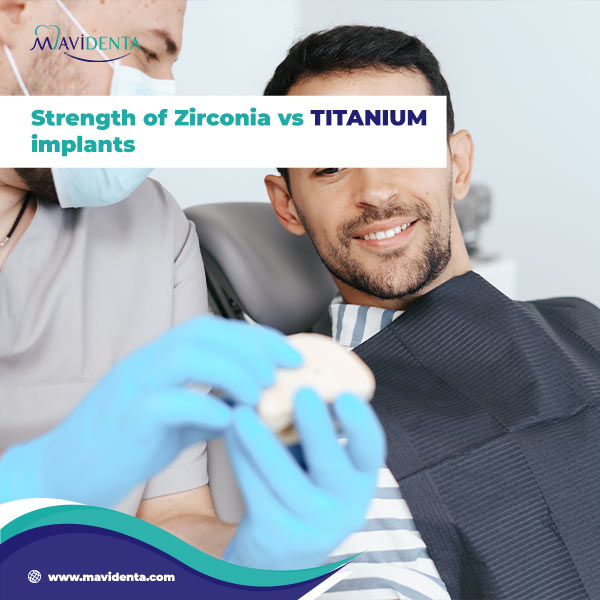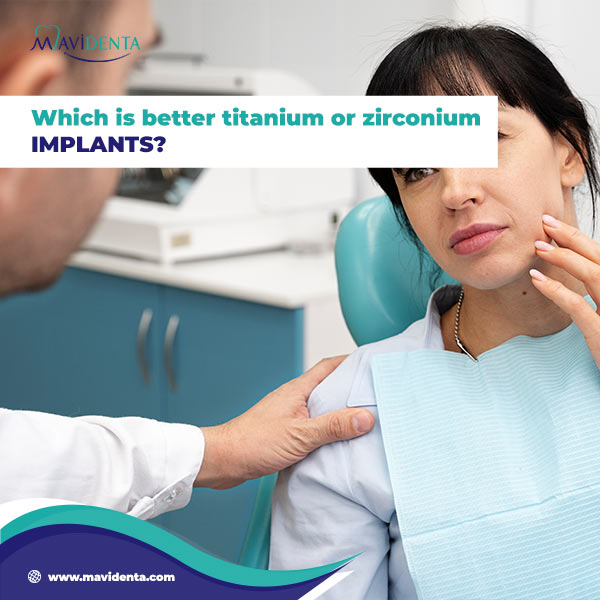Considering a dental implant? Wondering about dental implants zirconia vs titanium? Both are excellent options for replacing missing teeth, but they have some key differences. This guide will break down the pros and cons of each material to help you make an informed decision with your dentist.
What are The Differences between Zirconia vs Titanium Implants?
Dental implants zirconia vs titanium are two different types of dental fillings made from the same material, zirconium. While they are similar in some ways, there are several key differences between dental implants zirconia vs titanium, including:
- Purpose of Use: Zirconium dental implants are used to replace missing teeth – as an option for tooth replacement – while titanium are used to restore damaged or decayed teeth.
- Positioning: Zirconium implants are placed in the jawbone. Titanium is placed over existing teeth.
- Structure: Zirconium implants consist of an abutment implanted in the jawbone, an artificial tooth, or a dental crown retainer. Titanium, on the other hand, are free-standing restorations that cover the entire tooth.
- Durability: Zirconium implants are designed to be a long-term solution for missing teeth. It can last for many years with proper care. While titanium are durable, it may need to be replaced frequently due to wear and tear or changes in the underlying tooth structure.
Cost: Zirconium implants are usually more expensive than zirconium crowns. This is because of the additional surgical procedures and materials required.
It is important to note that zirconium dental implants and titanium are effective dental restorations. However, they serve different purposes and are used in different situations. Patients should consult their dentist to determine which type of restoration is best for their specific needs.
Read more: Which Is Better Zirconia Or Titanium Implants Should You Choose?
Zirconia vs Titanium Implants
If you are looking for a solution to tooth loss like dental implants zirconia vs titanium, you are probably considering using different implant materials. The best type of implant depends on each patient and their condition.
Many patients develop an allergy or sensitivity to the metal, leading to inflammation or even failure of the restoration. By choosing ceramic implants, you reduce the risks of such complications and treatment costs.
Additionally, a titanium implant can corrode in a moist environment, such as your mouth. The risk is greater if there is fluoride or more minerals in the area, such as amalgam fillings. In addition, such conditions increase the possibility of migration of the penis into nearby tissues or even into the lymph nodes.
In contrast, a zirconia implant is more fragile and the one-piece design can slow healing. It is a good idea to make an appointment with your dentist to discuss whether ceramic implants can be delivered in two pieces, with a custom-made abutment.
Also check: Finance Teeth Turkey
Strength of Zirconia vs Titanium implants

Nowadays, dental implants zirconia vs titanium grows out of most “childhood diseases” such as adherence to one-piece construction, limited fracture resistance, limited soft tissue implantation, etc. Regarding versatility, zirconia comes close to titanium alloys but has yet to be quite reachable in the short term.
However, when it comes to strength, titanium still has a nose ahead, especially when it comes to smaller implant diameters. A powerful feature of zirconia is its unique biocompatibility, proven as the best of all medical materials.
Also, the white colour of the zirconium implant can be seen as favourable, especially when it comes to gum or bone recession around the implant. The dark colour of titanium is a significant drawback, while the white look of its zirconia counterpart is still acceptable to be seen by most patients.
Another advantage of OSSEO-integrated implants is the material’s lack of thermal conductivity. Because of this property, the implantologist needs to be more skilled at not increasing the heat of the implant bed during implant insertion. Another advantage is the material’s non-conductivity to electrical currents in the mouth.
Read more: why are dental implants so cheap in Turkey
Aesthetic of Zirconia vs Titanium implants
Speaking of dental implants zirconia vs titanium, each type has many features that distinguish it from others. In addition, the dentist chooses what is most appropriate for the patient’s condition, and this is what we are keen on Mavidenta. Therefore, if you want to make a fateful decision about dental implants zirconia vs titanium, here are the characteristics of each type. Isolation:
Titanium implants are extremely durable:
Titanium implants must be strong and durable as they must support the bite force of the jaw, which is very important. Titanium alloy has a tensile strength comparable to steel! It also has the highest strength-to-weight ratio of all metals and fractures are rare because it is highly resistant to external forces, which means it is a great choice for dental implants!
Read more: Dental Centre Turkey Payment Plan
Lightweight:
Dental implants are placed in the jaw for many years, so in addition to being strong, dental implants must also be light, as the patient does not want to carry a large lump of metal in his mouth! Therefore, titanium alloy is similar in strength to steel, but it is 45% lighter, making it ideal for use in dental implants.
Continuity:
Titanium implants have been proven to be long-lasting. As we said earlier, the first titanium implants were placed in 1965 – and this process has continued incredibly well for over 40 years!
They have proven their longevity time and time again with a wide range of patients, so we know for sure that titanium implants are a very cost-effective and long-lasting solution to dental problems.
Histochemical biocompatibility:
Titanium is biocompatible, so it is hypoallergenic and well accepted and tolerated by the human body. Allergic reactions to titanium implants are rare and are generally considered non-toxic to the human body.
Note: Osseointegration is the process in which a dental implant fuses with the jaw. This takes several months to happen and is an important part of the transplant process.
Allows osseointegration:
There are only a few known materials that cause osseointegration or “osseointegration” and titanium is one of them. Titanium allows the implant to blend tightly with the bone, making it strong and stable.
Anti-corrosion titanium implants:
Titanium is characterized by its corrosion-resistant properties, which is very important in the field of dental implants. Titanium is also a source of oxygen, which means it forms protective oxide layers on its surface. This helps protect the implant against a wide range of materials that can damage it.
Titanium implants are non-magnetic:
Pure titanium and its alloys do not have magnetic or gravitational properties, which means that they are not susceptible to external interference. It can be used safely during magnetic resonance imaging (MRIs).
In contrast to dental implants zirconia vs titanium, we now move on to discussing the other type of dental implants, which is zirconium implant. The characteristics of this type are represented in the following points:
- Zirconium has wonderful features that make it one of the widely used materials in recent times. Let us detail these advantages of zirconium used in dental prosthetics:
- Hardness and strength. This feature protects the teeth from corrosion and breakage.
- It is quickly obtained, unlike the materials used in the past, as it is manufactured using modern methods that allow it to be received and installed in a short time, and sometimes at the same time as the visit, thus reducing the number of visits to the dentist.
- Its color is close to natural teeth, so it is a great aesthetic alternative to metal dental implants, especially in the teeth that appear in the smile.
- It is safe and does not interact with the oral tissues and gums surrounding the teeth, which maintains their health.
- It can correct yellowing and discolouration of teeth, as it covers the teeth without these problems appearing underneath.
- It can be shaped according to the standards of each case to obtain the best aesthetic results.
Read more: Wisdom Teeth Removal in Turkey
Durability of Zirconia vs Titanium implants
Regarding dental implants, zirconia vs titanium is the most popular material for dental implants because it has been shown to enhance the osseointegration process and is relatively more cost-effective. The bone begins to fuse into the titanium post one week after the implant, and the process continues for the rest of the individual’s life.
With proper maintenance, dental implants made of titanium and titanium alloy have a 95% success rate and can last a lifetime. Titanium dental material typically consists of two components: the implant abutment, which connects the implant screw to the crown and replaces the tooth root. This two-piece method makes deep implantation of titanium implants into human bone possible.
Zirconia has recently emerged as a potential implant material. Patients allergic to titanium are often recommended to have zirconia dental implants. Most zirconia implants require one session to complete. However, compared to titanium implants, they may be more challenging to install.
Your unique condition and requirements may determine the best material for dental implants. The transplant specialist will first evaluate your needs and suggest the best course of action during treatment.
Titanium Implants Main Components
The two main components of titanium implants are the screw that replaces the tooth root and the abutment that is added to attach the screw to the crown (the visible “tooth”). This two-piece method allows titanium implants to be inserted deep into the bone, where each component can be placed individually.
Typically, these items are placed at different times. Most zirconia implants are one piece, which indicates that the process can be finished in one session. However, zirconia implants can be more challenging to place. Each dental implant material offers unique advantages and characteristics. Your implant dentist will recommend an appropriate material for your condition based on your needs.
Read more: Best Clinic In Turkey For Dental Implants
Which is better titanium or zirconium implants?

There are pros and cons to dental implants zirconia vs titanium and we recommend a particular type of implant after listening to the patient’s concerns and goals. Here are some of the categories that are often analyzed when choosing between dental implants zirconia vs titanium:
- Cost – Zirconium implants cost more than titanium, so zirconium implants will cost more money. Insurance companies often do not cover dental implants, however, more and more we are seeing dental insurance covering a portion of the costs.
- Osseointegration and Soft Tissue Treatment – Both zirconium and titanium implant materials are biocompatible and integrate well with bone and gums, often titanium implant combinations for 20 years or more while zirconium is still in research as it has not been used long enough to tell long term success.
- Ease of Placement – Titanium implants have been the standard in tooth replacement care for some time as more people are turning to them instead of dentures to replace multiple teeth. Titanium implants have become a very popular procedure in dentistry and are considered easier for a dentist to place without complications if the bone density is poor.
- Good bone health, Successful surgical placement of zirconia implants has proven to be more challenging. Most zirconia implants are single pieces (both implant and abutment in one solid piece) which cannot be placed completely under the gum and are difficult to place at an angle.
- The ability to place the implant at a slight angle is important to the dentist because Sometimes, due to bone density and tooth appearance, the optimal position for the implant is slightly off-center.
- Aesthetics – For most patients, titanium gives great results. However, some patients are concerned about a visible gray line appearing under the gum or along the edge of the tooth. If patients have thin bone or gum tissue, a dental brace can be made of ceramic.
So that no gray metal appears through them. On the other hand, zirconium composites are famous for their aesthetics. The beautiful white tooth color of the ceramic material looks very natural and does not show through the gum tissue.
- Strength – Titanium fittings are incredibly strong, and have high flexural and fracture-resistant properties. Zirconium fittings have less ductility that can lead to more microfractures, but are also very hard and strong.
With so much information out there about both titanium and zirconia dental implants, it’s no wonder many patients have difficulty deciding which material they prefer.
Read more: Best country for dental work in Europe
How long do titanium implants last?
Both dental implants zirconia vs titanium are suitable for use in dental implants and prosthetics; This is because it possesses many physical, chemical and biological properties. The reasons for titanium being widely used in dental implants include the following:
- Biocompatibility: Titanium fuses very effectively with bone without causing any negative and harmful effects on the body. It also does not cause allergies and is not toxic either. Therefore, dental implants made of titanium can remain in place for 30 years or more without damage. Cause any complications.
- Very Durable: Dental implants must be strong and durable to withstand the force of jaw biting and chewing; Using titanium for dental implants is a good option because it has a very high durability compared to other types of metals, so fractures rarely occur in titanium implants as they are very resistant to external forces.
- Anti-corrosion: Titanium has second-to-none anti-corrosion properties; The outer thin layer consists of a harmless inert oxide that has much greater anti-corrosion properties than stainless steel, making it resistant to many external factors that may cause corrosion.
- Long lifespan: Most people who have had titanium dental implants can have these implants for long periods of time, which can last a lifetime if they are cared for and given proper attention, including maintaining proper oral hygiene and performing periodic dental examinations. And regular.
- High success rate: The success rates of using titanium for dental implants vary from one study to another, but all studies indicate that dental implants using titanium are a successful procedure, and according to some research published, the success rate exceeds 95%.
Read more: How To Get Dental Implants Without Insurance: Convenient
Conclusion
Many different dental implant materials are available such as dental implants zirconia vs titanium, and cost is another important aspect to consider. Find out if the clinics offer you good quality implants by promising low cost dental implants. Most individuals consider the materials used for dental crowns when considering the different materials. However, the material of the implant’s metal post is equally important.






